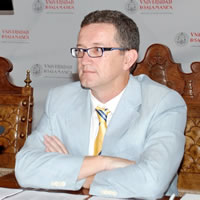Exploring phonological resemblances between languages of different genetic origin in roughly the same geographical area will not lead us to counter-propose a different genetic affiliation. The idea is that all or most of them have replaced former languages existing in their respective areas. Language shift, necessarily, results in the incorporation of a few traits from the language replaced into the new one replacing it. This substratum phenomenon is well known in the context of language shift and has been extensively researched. When and if we are able to identify specific linguistic traits (the more specific the better) that imply neat and significant divergence between particular languages and other languages of their respective families, it could be indicative that these traits in particular were triggered by some characteristics of the languages they geographically replaced. If more than one language group in the same geographical area share some of these traits, there is a greater possibility that something discernible relating to the replaced language of that area has been left behind and that we might be able to glean indirect information about some of the characteristics of the language(s) once spoken there and later replaced. In this presentation we will be exploring how the effects of the shift to Proto-Celtic from an unknown pre-Indo-European language (or languages) could have affected Proto-Celtic, and also how the shift to late Latin from various Celtic dialects could have affected Western Romance languages. We also aim to demonstrate how the substratum phenomenon could have implications about our views concerning the historical geographic position of different languages; Basque, for example – or lost languages with phonetic similarities to Basque, not necessarily genetically related to it – sharing borders with Celtic, Lusitanian, Italic and other languages or language groups (even Germanic?).

Juan-Luis has been Professor of Greek at the Department of Classical Philology, University of Salamanca, since 2002. He has also undertaken various other duties at Salamanca, including Academic Secretary of the Faculty of Philology (2004–2010), Vice-Dean for International Relations and Erasmus Coordinator of the Faculty of Philology (2010–2012) and Director of the Centre for Continuing Education (2014–2018). During the earlier part of his career he was a visiting scholar and researcher at various universities, including Trinity College Dublin (1988–9), where he started his research in Celtic languages, Oxford (1991–6) and Harvard (1991–4), two institutions at which his PhD dissertation took shape and where his first postdoctoral research was undertaken. He was awarded his PhD (Salamanca, 1993) in Classical Philology and Indo-European Linguistics and his research continues to be informed by a strong interdisciplinary approach. As a scholar in the field of Ancient Indo-European (particularly Hispano-Celtic) Languages, the centrality of onomastics in his linguistic research has led to interactions with other fields such as Archaeology, Ancient History and the History of Science. Through his work on Claudius Ptolemy he has developed an interest in the geographical and astronomical knowledge of Ancient Greece and in how this is reflected in literature, as well as in the education and scientific research of the Greek Orient. Among his publications are La Península Ibérica en la Geografía de Claudio Ptolomeo (Vitoria, 2003) and the edited volumes Continental Celtic Word Formation: Onomastic Data (Salamanca, 2013) and Celtic and Other Languages in Ancient Europe (Salamanca, 2008). One of his more recent contributions, ‘La soledad del vasco’ was published in Studia Philologica et Diachronica in Honorem Joaquin Gorrochategui. Indoeuropaea et Palaeohispanica, José María Vallejo, Iván Igartúa y Carlos García Castillejo (eds.), Anejos de Veleia Minor, 35 (Vitoria, 2018), 127–146. At present, Juan-Luis is the Principal Investigator of the Erasmus+ KA2 CBHE project XCELING (Towards Excellence in Applied Linguistics), 2017–2020, and since 2012 he has been a member of the Editorial Board of the journal Minos.